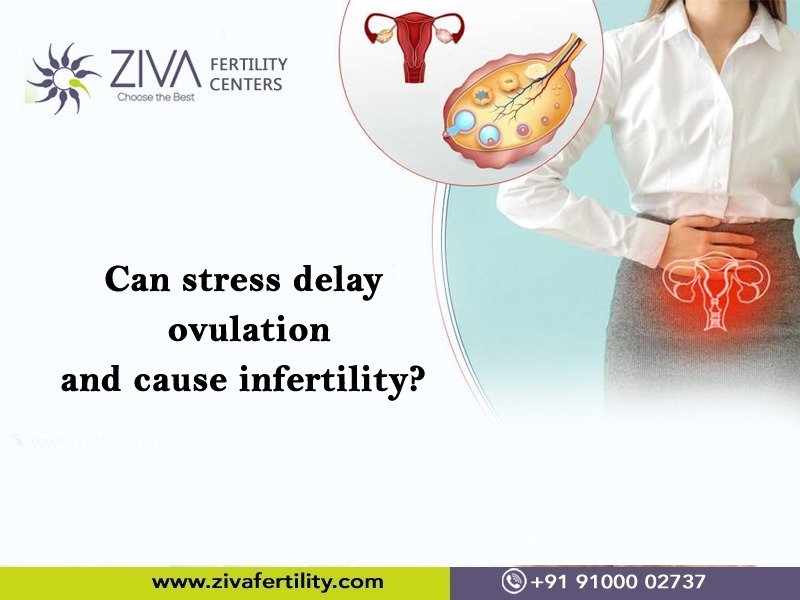Any couple will be over the moon the day they realise they are about to welcome their bundle of joy. Apart from regular unprotected intercourse, maintaining a healthy body and mind greatly aids in conception. Due to fast-paced lifestyles and increased financial commitments, couples are finding themselves to be leading more stressful lives nowadays. So, in this blog, let us assess the impact of stress on ovulation and fertility.
Can stress delay ovulation and cause infertility?
Out of the growing causes of infertility, stress is one of the top ones.
- Stress causes the body to produce hormones such as cortisol and the enzyme alpha-amylase. Both these hormones alter the release of reproductive hormones that affect ovulation and the menstrual cycle. Cortisol primarily inhibits oestrogen production and egg quality.
- The stress hormone CRH -the corticotropin-releasing hormone is found in reproductive organs like the uterus, placenta, and ovaries, so implantation is affected.
- When one is under stress, epinephrine and dopamine are produced, which may affect blood flow to your reproductive organs. Stress indirectly affects fertility as it reduces the libido and disrupts sleep.
- Apart from physical changes, there could be behavioural changes in women to deal with stress. They take up alcohol and smoking and also could start binge eating unhealthy food. All these habits reduce fertility and also increase weight.
- A study published in the American Journal of Epidemiology found higher levels of stress were associated with lower chances of conception for women. This study was conducted on 4,500 couples who were trying to conceive, with no history of infertility and were not receiving fertility treatment.
Why does stress delay ovulation?
Stress delays ovulation due to high levels of cortisol – a hormone your body produces when it’s stressed – can affect your hypothalamus. Stress delays your ovulation cycle in your menstrual cycle, or you may not ovulate at all. To know if you are ovulating, examine your cervical mucus and your basal body temperature or use ovulation predictor kits.
If your stress levels are causing irregular periods, talk with your doctor about a possible hormonal imbalance that may be treatable with medication.
Can stress reduction improve fertility?
Reducing stress indirectly improves fertility. It is good for overall health, and having less negative stress can certainly improve your daily life. You are in a happy place, your relationships improve, and your sex life also gets better. When stress is within limits, the hormonal system also works very well.
Ways to destress yourself when trying to conceive
There are many medical and non-medical options that one can try. If the couple adapts them together, the success rates will be high. However, it is always good to start with non-medical options such as lifestyle modifications before considering medication and hormonal therapy. One can try:
- Cognitive behavioural therapy (CBT)
- Relaxation techniques
- Stress management and coping skills training
- Mindfulness training to reduce stress, anxiety, and depression.
- Identify your everyday stress triggers. Work on what you can do to reduce or eliminate these stressors.
- When you notice that your stress levels are increasing, find ways to destress. Go for a walk in a peaceful environment, and talk to a good, supportive friend.
- If you’re in the midst of a move or job change or you’ve experienced a loss recently, focus on self-care. Surround yourself with loved ones to navigate these waters. Do not try to do everything by yourself only.
- Seek professional help with individual and group therapy.
- Start self-care by making sure you.
- Sleep well by keeping a regular schedule (and avoid the night shift at work, if you can). All digital devices such as computers, phones, and other electronics must be kept away before sleeping. One must get at least 7 or 8 solid hours of sleep each night.
- Eat well by cutting down on refined carbs, trans fats, and added sugars. Consuming a diet rich in plant-based proteins, omega-3s, dietary fibre, and vitamins and minerals can positively impact fertility.
- Exercise can directly impact your fertility. It is suitable for overall mental and physical health and can help reduce stress. For heavy exercise, make sure your calorie intake meets the demands of your routine.
- Maintain an appropriate weight, which means neither being overweight nor being underweight. According to the U.S. Department of Health & Human Services, overweight and obesity can affect fertility by preventing ovulation and keeping fertility treatments from working. At the same time, being underweight can cause irregular menstrual cycles as your body stops making oestrogen.
- Yoga reduces anxiety and stress among women struggling with infertility. Reduced stress also improves ART success rates if the couple are going through any ART.
- Meditation and mindfulness practices positively impact fertility. A study published in Fertility and Sterility conducted on 140 women undergoing IVF treatment found that women who participated in a mind-body program for stress reduction had a significantly higher pregnancy rate during their second IVF cycle than those who didn’t attend the program. A study done by the General Hospital Psychiatry in Japan concluded that a five-session mindfulness program significantly decreased psychological discomfort and significantly increased the pregnancy rate within the one-year follow-up period.
We at ZIVA Fertility Clinics place a lot of importance on reducing stress levels. We offer counselling services to help couples manage stress. If couples are undergoing infertility treatments, there is an added anxiety about the results. Especially if there were previously failed attempts, couples could get more anxious, which will further impact the following sessions. One of the ways that ZIVA helps reduce stress is by being honest with couples about their chances. We offer varied treatment options, starting from the simplest and most cost-effective means before proceeding to time-consuming procedures. For more information, please visit our website https://zivafertility.com/ or contact us at +91-9100002737 or +91-9392834024.
















